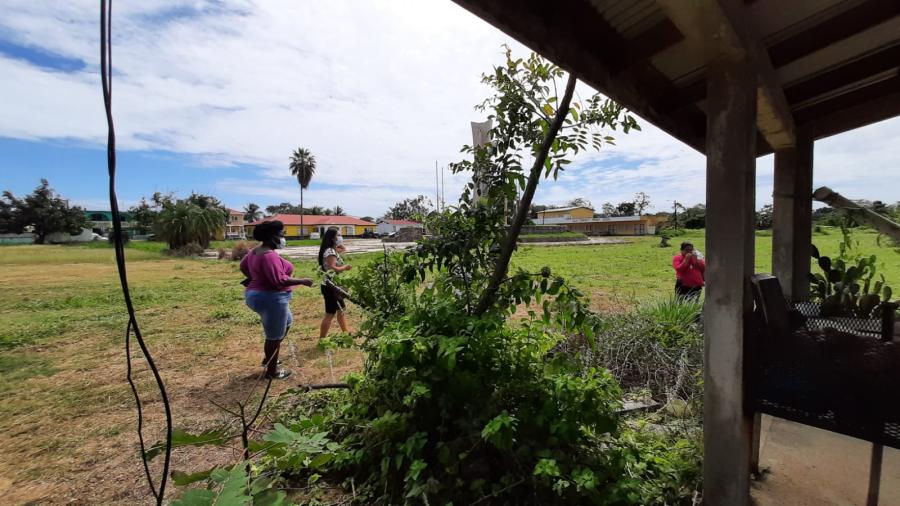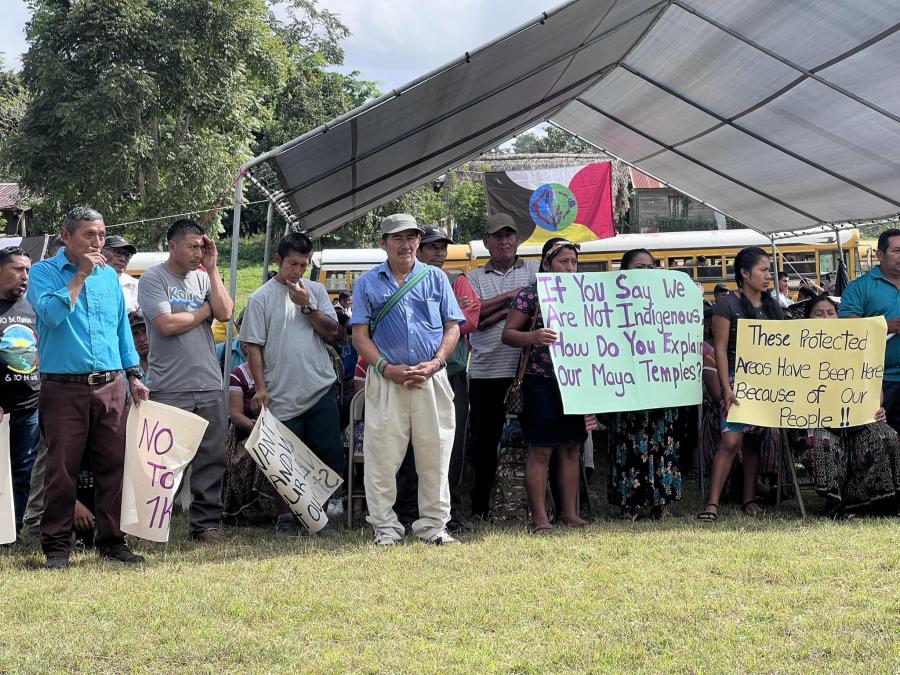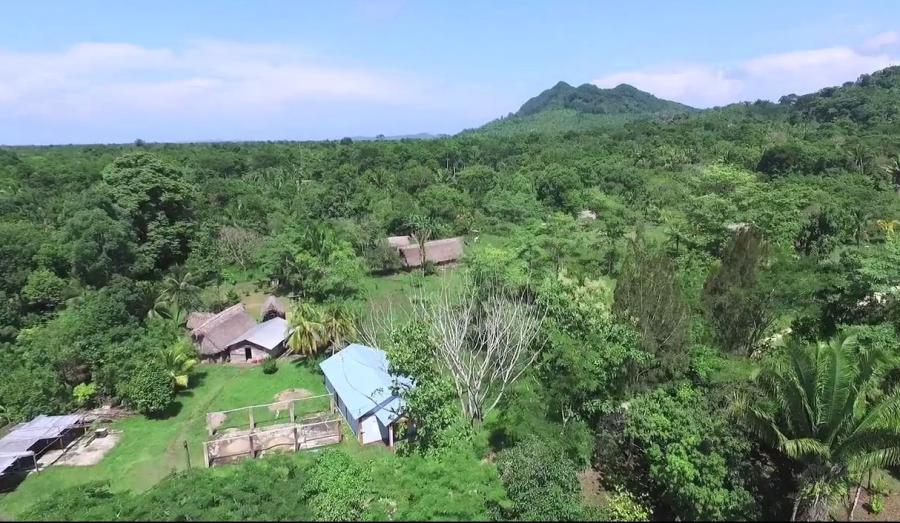
Photo: Ms. Monica Magnusson speaks at the United Nations Permanent Forum on Indigenous Issues.
Credit: Jamie Malcolm-Brown

For Immediate Release
In April 2018, a legal representative of the Maya Leaders Alliance and the Toledo Alcaldes Association traveled to the United Nations to ask for solidarity from diplomats around the world in the upholding of the court decisions guaranteeing Maya Peoples title to their lands.
April 22, 2018 marks three years since the Maya people of southern Belize achieved a groundbreaking victory at the Caribbean Court of Justice, Belize’s highest appellate court. The court’s decision reaffirmed that the 39 Q’eqchi and Mopan Maya Indigenous communities of southern Belize have rights to the lands they have customarily used and occupied and that these traditional land rights constitute property equal in legitimacy to any other form of property under Belizean law.
Ms. Monica Magnusson, Maya Q’eqchi attorney representing the 39 communities in the case at the Caribbean Court of Justice, submitted a statement to the United Nations Permanent Forum on Indigenous Peoples Issues while in attendance at the event in New York.
“We have exhausted all possible domestic and international legal mechanisms to obligate Belize to respect our collective rights to our lands, and still, the State has continued to allow third parties to adversely affect the value, use, and enjoyment of our lands. This includes issuing of concessions for oil exploration, logging, and the demolishing and desecration of our sacred sites, and undermining the authority of our traditionally elected leaders who defend our lands.
“We ask members of the forum: what further recourse do we have as Indigenous Peoples when the executive branch of a government can choose to freely disregard the rule of law issued by their own Supreme Court, to disregard recommendations from the Inter-American Commission, to disregard the ruling of its highest appellate court, the Caribbean Court of Justice, to disregard two cycles of UPR Recommendations from their peers?”
In November 2018, the state of Belize is up for review under a human rights compliance mechanism called the Universal Periodic Review. In this session, Belize should be held accountable for it’s failure to abide by its own domestic law as well as international law. The Maya Leaders Alliance in partnership with Cultural Survival submitted a stakeholder’s report to the Universal Periodic Review outlining violations to Indigenous Rights experienced by the Maya People of Southern Belize.
Ms. Magnusson’s statement concluded, “We simply request that the rule of law be respected. The Maya Peoples’ land rights case has wide implications for litigation by Indigenous Peoples in Latin American and the Caribbean as well as internationally, and if the government is allowed to fail in upholding the rule of law, we will all go down a dangerous path.” Read her full statement here.
Statement to the United Nations Permanent Forum on Indigenous Issues; April 2018, New York from Cultural Survival on Vimeo.
Timeline
|
1981 |
Belize was founded on principles of democracy and human rights. Approximately 11% of the population of 360,000 is Maya. |
|
1994 |
State violates Maya rights in creation of a national park on Maya ancestral land. Since then, government-allowed logging and oil exploration on Maya lands have prevailed. |
|
2004 |
Inter-American Commission on Human Rights recommends that Belize delimit, demarcate, and title the traditional Maya lands in the Toledo district, and abstain from further acts that affect the existence, value, use, or enjoyment of the property in traditional Maya territory. |
|
2007 |
Two Maya communities filed for recognition of property rights in the Supreme Court of Belize. The court contended that Belize is obligated to respect and protect Maya land rights in the Toledo District. It again affirmed the Inter American recommendations to delimit, demarcate, and title the traditional Maya lands in the Toledo district, and abstain from further acts that affect the existence, value, use, or enjoyment of the property in traditional Maya territory; becoming the first national high court to cite the UNDRIP. |
|
2008 |
Remaining 37 Maya communities filed a lawsuit on the same grounds as two previous communities as the government refused to acknowledge that the first Maya land rights claim applied to all Maya communities in southern Belize. Again, the court found in favor of the Maya communities, however, the case was appealed. |
|
2009 |
At first UPR cycle, Belize was recommended to respect the UNDRIP and protect Maya customary land rights. |
|
2013 |
At second cycle of UPR, Belize was urged again to address Indigenous rights and protect Maya land from projects that lack their consent. |
|
2015 |
Belize’s highest appellate court, the Caribbean Court of Justice (CCJ), affirmed the Maya people’s customary land rights and ordered the state to abstain from further acts that may affect the existence, value, use, or enjoyment of the property in traditional Maya territory. It also ordered the need for consent and consultation prior to any potential interference with these rights. |
|
2016 |
Following the CCJ order, the government established the Toledo Maya Land Rights Commission, intended to develop a draft implementation plan by June 2016. No plan has been completed, and in October 2017 the Commission stated that it would not take on the demarcation and documentation process. Further, the TMLR Commission has met with the MLA only twice, and was not receptive to MLA and TAA input. The government also called into question the legitimacy of MLA and TAA as the Maya people’s chosen representatives. |
|
2017 |
Maya Leaders Alliance and Cultural Survival submit joint stakeholder’s report to the third cycle of Belize’s Universal Periodic Review, scheduled for November 2018. |
|
2018 |
Three years after the CCJ order, there is still no work plan in place to implement the order. |
For more information or for an interview, contact
Pablo Mis, Program Coordinator, Maya Leaders Alliance, mayaleadersbelize@gmail.com
Danielle DeLuca, Program Manager, Cultural Survival, danielle@cs.org



